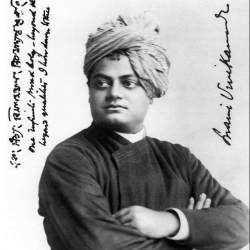
Swami Vivekananda
| Date of Birth | : | 12 Jan, 1863 |
| Date of Death | : | 04 Jul, 1902 |
| Place of Birth | : | Kolkata, India |
| Profession | : | Philosopher |
| Nationality | : | Indian |
Swami Vivekananda, born Narendranath Datta, was an Indian Hindu monk, philosopher, author, religious teacher, and the chief disciple of the Indian mystic Ramakrishna.
Biography
Born into an upper-middle-class family of the Kayastha (scribes) caste in Bengal, he was educated at a Western-style university where he was exposed to Western philosophy, Christianity, and science. Social reform became a prominent element of Vivekananda’s thought, and he joined the Brahmo Samaj (Society of Brahma), dedicated to eliminating child marriage and illiteracy and determined to spread education among women and the lower castes. He later became the most-notable disciple of Ramakrishna, who demonstrated the essential unity of all religions.
Always stressing the universal and humanistic side of the Vedas, the oldest sacred texts of Hinduism, as well as belief in service rather than dogma, Vivekananda attempted to infuse vigour into Hindu thought, placing less emphasis on the prevailing pacifism and presenting Hindu spirituality to the West. He was an activating force in the movement to promote Vedanta philosophy (one of the six schools of Indian philosophy) in the United States and England. In 1893 he appeared in Chicago as a spokesman for Hinduism at the World’s Parliament of Religions and so captivated the assembly that a newspaper account described him as “an orator by divine right and undoubtedly the greatest figure at the Parliament.” Thereafter he lectured throughout the United States and England, making converts to the Vedanta movement.
On his return to India with a small group of Western disciples in 1897, Vivekananda founded the Ramakrishna Mission at the monastery of Belur Math on the Ganges (Ganga) River near Calcutta (now Kolkata). Self-perfection and service were his ideals, and the order continued to stress them. He adapted and made relevant to the 20th century the very highest ideals of the Vedantic religion, and, although he lived only two years into that century, he left the mark of his personality on East and West alike.
Death
On 4 July 1902 (the day of his death), Vivekananda awoke early, went to the monastery at Belur Math and meditated for three hours. He taught Shukla-Yajur-Veda, Sanskrit grammar and the philosophy of yoga to pupils, later discussing with colleagues a planned Vedic college in the Ramakrishna Math. At 7:00 pm Vivekananda went to his room, asking not to be disturbed; he died at 9:20 p.m. while meditating. According to his disciples, Vivekananda attained mahasamādhi; the rupture of a blood vessel in his brain was reported as a possible cause of death. His disciples believed that the rupture was due to his brahmarandhra (an opening in the crown of his head) being pierced when he attained mahasamādhi. Vivekananda fulfilled his prophecy that he would not live forty years. He was cremated on a sandalwood funeral pyre on the bank of the Ganga in Belur, opposite where Ramakrishna was cremated sixteen years earlier.
Quotes
Do one thing at a Time, and while doing it put your whole Soul into it to the exclusion of all else.
whatever you think that you will be. if you think yourself weak, weak you will be; if you think yourself strong,you will be
All differences in this world are of degree, and not of kind, because oneness is the secret of everything.
Each work has to pass through these stages—ridicule, opposition, and then acceptance. Those who think ahead of their time are sure to be misunderstood.
Ask nothing; want nothing in return. Give what you have to give; it will come back to you, but do not think of that now.
